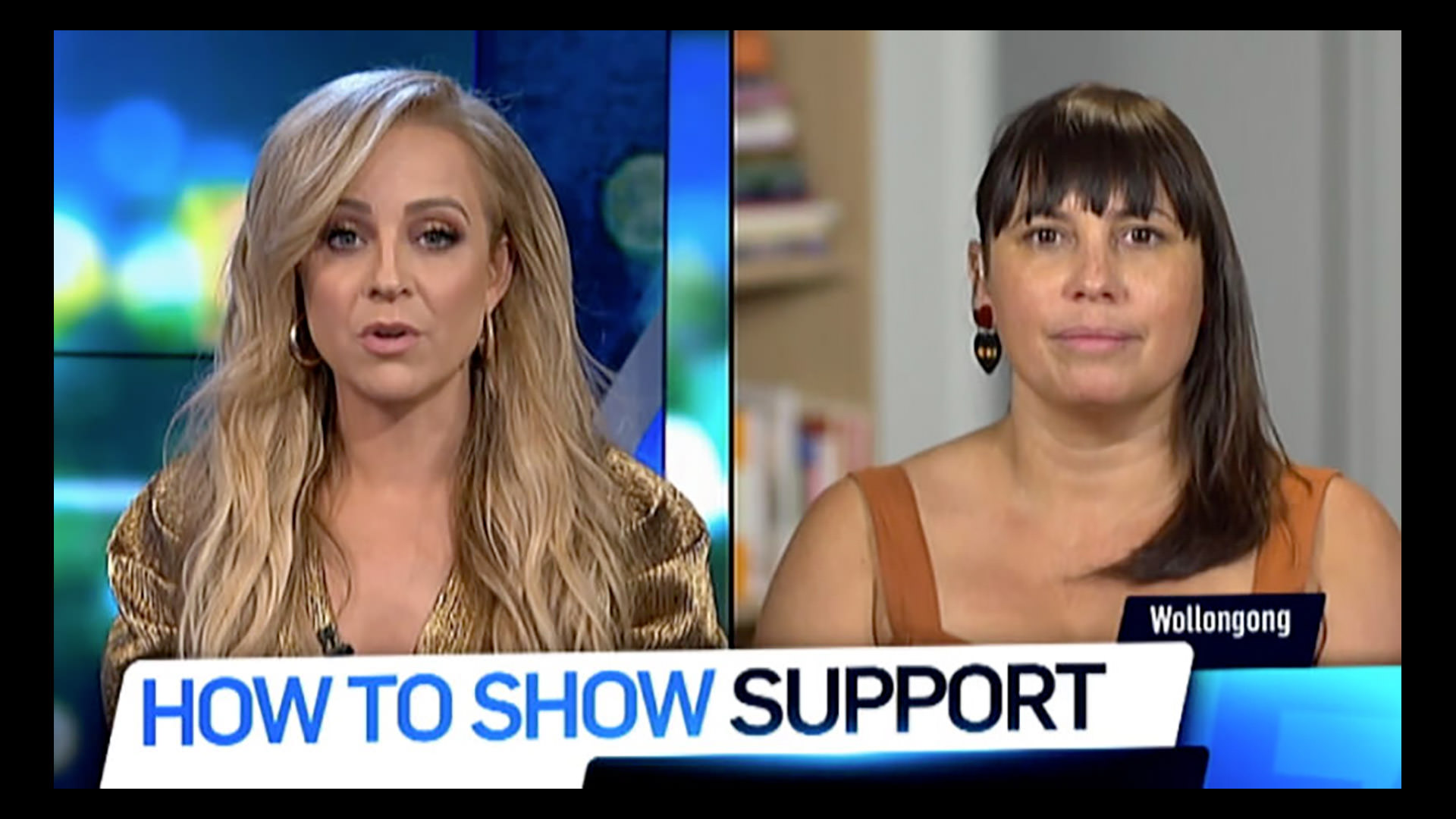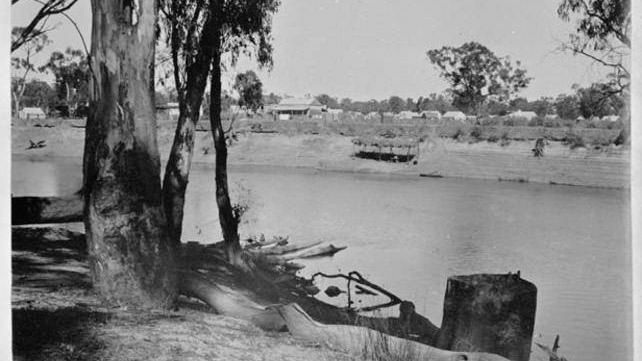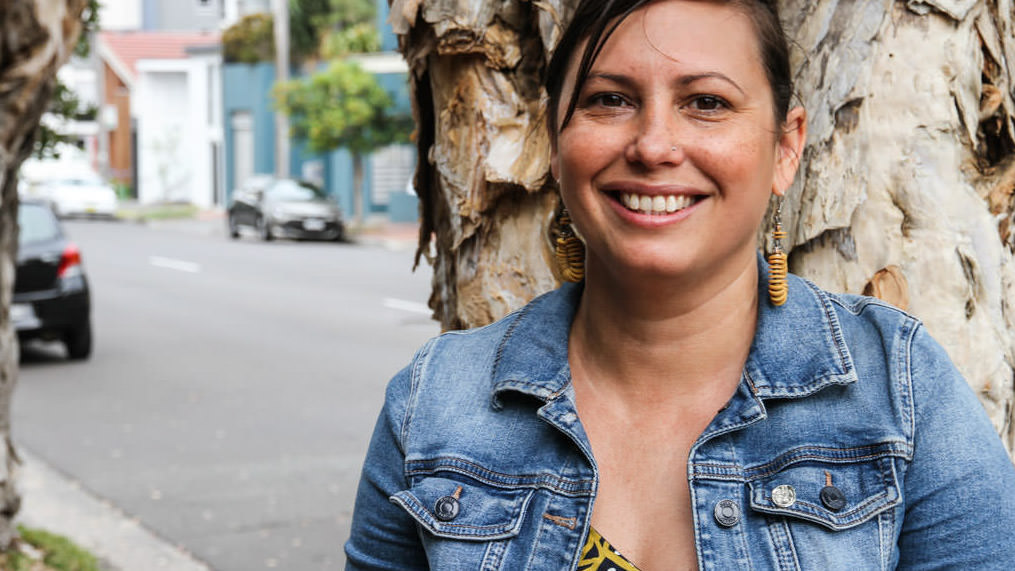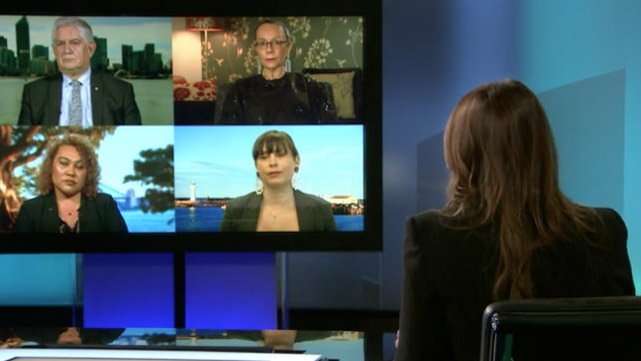Summer May Finlay: a voice for change
Why the Yorta Yorta woman has always had a strong voice on the needs and rights of First Nations People
August 25, 2020
When the Black Lives Matter protests swept the world earlier this year, Dr Summer May Finlay was front and centre sharing her views on the movement.
Aboriginal and Torres Strait Islander people should be aware that this article may contain images, or names of deceased persons in photographs and/or text.
"No more boomerang
No more spear;
Now all civilized -
Colour bar and beer."
This is the poem that 12-year-old Summer May Finlay recited at a 1993 eisteddfod in Sydney. In front of a sea of white faces, there stood an Aboriginal girl, proudly sharing her culture.
The opening lines of No More Boomerang, by Oodgeroo Noonuccal, speak about the assimilation of Aboriginal people. The theme permeates the remainder of the 1964 poem. It is as relevant today as it was back then.
"So here I am, 12, in Sydney at a drama eisteddfod which is predominantly white, a lot of private school students, performing a very Aboriginal piece," Dr Finlay says with a laugh as she tells the story. "I've always had a voice."
It's a voice that more and more people, including media, are seeking out when they want a straightforward and shoot-from-the-hip perspective on issues from which many shy away.
In June, as Black Lives Matter protests swept the world, people started posting black tiles on their social media feeds to protest against racial inequality. Channel 10's The Project sought Dr Finlay's perspective on what had become known as #blackouttuesday - the hosts asked her if posting a black tile was enough.
"If that's all they're doing it really is demonstrating their ongoing ignorance of Aboriginal and Torres Strait Islander issues, and other issues in this country, around people of colour," she replied at the time.

Dr Finlay went on to tell hosts Carrie Bickmore and Waleed Aly that too many people are reaching a point of wilful ignorance when it comes to supporting Aboriginal issues.
"Lots of people do need encouragement around what to say and how to say it, but I have to say we've been dealing with race relations in this country since invasion, so it's really quite interesting that people still don't feel confident to say the right thing," she told the program.
"If you're not confident on what to say, then you need to start educating yourself."
---
Edna, Dr Finlay's grandmother, was born in 1930 on Cummeragunja Mission Station, an Aboriginal reserve located in Yorta Yorta country, on the Murray River.
"When my grandmother was born she had no autonomy over her own life, it was dictated by the state," Dr Finlay says. "The conditions at Cummeragunja were really bad and you weren't even allowed off those missions without permission, until the legislation changed."
On 4 February 1939, the Cummeragunja Walk Off happened. Approximately 200 Yorta Yorta people, including Dr Finlay's grandmother, then a young woman, walked off Cummeragunja to protest against the poor living conditions and management of the station. The strike lasted for nine months and eventually the mission manager was transferred.
Edna was only a child when it happened and unknowingly played an important role in Australia's history - the Cummeragunja Walk Off was considered the first ever mass strike of Aboriginal people in Australia, eventually bringing about changes to the Aborigines Protection Act of NSW.

Cummeragunja Mission Station, on the Murray River.
Dr Finlay is a proud Yorta Yorta woman and is passionate about her family and their history. It's easy to understand her drive for raising awareness of Aboriginal and Torres Strait Islander issues, particularly when it comes to health.
"My grandmother passed away before I was born, she was only 49. My mum's family - my aunty, my uncle, cousins - they've all died really young. So, when I look at the statistics that people talk about when it comes to health and life expectancy, that's actually my family," she says.
"It's part of the reason I am really passionate about health - we know that Aboriginal and Torres Strait Islander peoples' life expectancy is a lot lower than non-Indigenous Australians.
"A lot of the reasons for that are because of social and political issues that occurred in the past and that continue to occur."
It was a natural fit when Dr Finlay pursued a career in public health. Her undergraduate degree was in Social Sciences and she followed up with a Master of Public Health. In 2019 she completed a Doctor of Philosophy (PhD).
"My PhD was a policy analysis around key performance indicators the government developed for the Aboriginal Community Controlled Health Sector. The KPIs were what we used to measure and monitor closing the gap," she says.
"I was looking at whether the design and implementation of those KPIs impacted the sector positively or negatively."
It's an area Dr Finlay knows well - before moving into academia she spent many years working in the Aboriginal Community Controlled Health Sector, mostly in policy and research.
She is now a Lecturer in the Faculty of the Arts, Social Sciences and Humanities at the University of Wollongong and also a Postdoctoral Fellow at the University of Canberra on a National Health and Medical Research Council-funded project.

Dr Summer May Finlay. Photo: Supplied
At UOW Dr Finlay teaches two subjects - Indigenous Social Determinants of Health and Collaborative Research Methodology. She is also working across the School of Health and Society to embed Indigenous perspectives into the curriculum. The teaching side of academia is one she didn't expect to enjoy quite so much.
"I love the contact with students and seeing those lightbulb moments when they haven't had much exposure to Aboriginal and Torres Strait Islander content, really seeing them start to understand and asking poignant questions," she says.
"Most of my students aren't Indigenous and when the Black Lives Matter movement was getting a lot of media coverage it was interesting to see how they reacted to it.
"Quite a few told me I helped them really understand the issues at play and also gave them the language to talk to other non-Aboriginal people about this stuff.
"If that's all they took out of my class, then I'm happy."
You don't have to spend long with her to work out Dr Finlay is the type of teacher any student would hope for - warm, engaging and motivating. The importance of her role isn't lost on her.
"We need Aboriginal and Torres Strait Islander teachers so that when our students go out into the workforce, they're actually much more culturally aware than they were previously."
Summer May Finlay grew up on Lake Macquarie, Saltwater People country, a long way from the Yorta Yorta country of her grandmother, a Freshwater person.
"In the late '40s and early '50s, when Aboriginal people were finally allowed to move off the mission, my grandmother travelled up north for fruit picking work," she says.
"She then had her own family and they did it pretty tough. It's how my mum grew up and I guess she didn't know any different.
"Mum left school at 14 to get a job. As a kid it was normal for her and on reflection I realise now, how challenging that would have been."
Dr Finlay grew up with her parents and two younger brothers. Her Dad isn't Aboriginal but she says he's proud to have Aboriginal children and always encouraged them to know their culture.
"It's probably been a sharp learning curve for Dad because he hasn't experienced racism directly, but he has experienced it through us," she says.

Dr Summer May Finlay on the ABC's National Reconciliation Week panel.
Dr Finlay says growing up in the '80s and '90s was much easier for her than it was for her own mother and grandmother as children, but racism was still part of everyday life.
"I don't think you can really know or appreciate racism until you have experienced it at some level - whether it's blatant racism or those everyday microaggressions," she says.
Dr Finlay goes on to talk about the first time she was called an Abo in year three and how, even though she'd never heard that word before, "you could tell by the tone that it was a really bad word". The teacher's response was inadequate - telling her it was just like someone calling you any other bad name.
"But it's not," she says. "I remember the conversation with him really clearly because I remember thinking 'Right, people in authority just don't get it and there's no point me complaining about it because racism isn't going to be taken seriously here'."
There was another time in Moree when Dr Finlay was with her Mum and two brothers at the local pool and they were refused service when they tried to buy an ice-cream after their swim.
My earliest racist experience was being called an “Abo” by a kid a in primary school.
— Dr Summer May Finlay (@SummerMayFinlay) July 3, 2020
I spoke to the principle and he said that it was just name calling and there was nothing he could (or would) do.
I knew then that non-Indigenous ppl wouldn’t take racism seriously. https://t.co/eRznAFF2Vt
Or that time a taxi driver was having a wonderful conversation with Dr Finlay in Melbourne, but when he discovered she was Aboriginal, he turned on her.
"Racism has always been a part of my life, whether it's been racism by obscuring Aboriginal history, or racism by lack of inclusion," she says.
Dr Finlay acknowledges that things have certainly improved, but we've still got a long way to go. Today, she says, it's the daily microaggressions which are exhausting. The small comments can become tiring, ones about "not looking Aboriginal" or asking where "I've got my tan from".
"So I'm too brown to be white, but I'm too white to be brown and it's someone then deciding what I am based on what they think an Aboriginal person should be," she laments.
Does the Black Lives Matter movement give Dr Finlay hope that things might change? She says it depends on the type of change people expect.
"You can't have such a big sustained movement without some level of change - if we're talking about change being an increase in understanding of the issues relating to people of colour generally, and then specifically to Aboriginal and Torres Strait Islander people and things like over-incarceration rates, then yes, I think there will be change," she says.
"But whether there will be substantive legislative change, then I don't know. I'm always hopeful and I think there could be small shifts - although I think people want a lot more."
The abuse and deaths in custody of people of colour is not new. In Australia alone there have been more than 400 deaths in custody of Aboriginal and Torres Strait Islander people since 1991. But it's been the death of George Floyd at the hands of police in the United States in May this year, that has been a catalyst for mass protests across the world, including Australia.
The reasons for why people have reacted so strongly to Floyd's death, and not others, is complex. But Dr Finlay says for many it is simply just the last straw.
"There's been so much build up and it reaches a crescendo. When we saw George Floyd's words transcribed and realised how many times he said 'I can't breathe', how explicitly he begged for his life, the dam walls really couldn't hold back anymore.
"With social movements, when something boils over, things become deafening and it emboldens other people to actually join the action. I think it's a good thing."
The media voraciously sought Dr Finlay's perspective during the height of the Black Lives Matter protests and while she was happy to give it, she said she doesn't want to be the only person talking about these issues.
"People always say I have thick skin, and I do, and I know that not everyone is as outspoken as me, but we can't build a society around people like me.
"We actually have to build a society around protecting the more vulnerable people who might not always have the resilience or confidence to stand up to racism or microaggressions," she says.
In the university context, Dr Finlay wants to see more investment in Aboriginal staff, outside of their discipline, to help them become more confident and better advocates for the university and Aboriginal and Torres Strait Islander people.
She believes things are going in the right direction and says a shift in the broader world towards a focus on cultural safety gives her hope.
"In Australia that would look like cultural safety defined by Aboriginal and Torres Strait Islander people," she explains.
"If we move towards a position where it's Aboriginal and Torres Strait Islander people that get to define how the world needs to behave to be culturally safe, then we're starting at a systemic level."
She says this approach will undermine individual racism and help eradicate the institutionalised racism that exists everywhere.
"I don't think all institutions mean to be structurally racist, but because they haven't included Indigenous perspectives in decision making, the exclusion really disadvantages Aboriginal and Torres Strait Islander people."
Dr Finlay is quick to reiterate that allowing for diversity amongst Indigenous voices is important.
"Aboriginal and Torres Strait Islander people are varied and different, we had over 250 nations in this country. There is not one person who can advocate on behalf of all Aboriginal and Torres Strait Islander people.
"It would be like one woman speaking on behalf of all Australian women. It's important to make sure there's multiple Aboriginal and Torres Strait Islander voices being heard."
But it's non-Aboriginal people who really need to do the heavy lifting when it comes to change and racism in Australia says Dr Finlay.
"Racism is a white issue - Aboriginal and Torres Strait Islander people make up just three per cent of the population and we really need the 97 per cent to pull their weight," she says.
And it's this 97 per cent of Australia's population who Dr Finlay believes can truly shift attitudes and beliefs and, in Dr Finlay's ideal world, get the Uluru Statement adopted.
Great read on what can be done. Echos the #UluruStatement & Uluru Dialogues - local representation, authority & control, & the need for truth. First Nations Voice in the Constitution is key! Great work @SummerMayFinlay & others! #IndigenousX #auspol https://t.co/O311RQOdhn
— ulurustatement (@ulurustatement) June 29, 2020
The Uluru Statement from the Heart outlines a path forward for recognising Indigenous Australians in the nation's constitution.
There are three elements to the Uluru Statement - a First Nations Voice to Parliament; the establishment of Makarrata Commission to supervise a process of agreement-making with Australian Governments; and a truth telling about Australia's history and colonisation.
Dr Finlay says any effort to get the Uluru Statement constitutionally enshrined will take grit and political guts and is hopeful Australia's politicians have the will to do it.
"When we have mechanisms in place whereby Indigenous Australians are generally driving processes to benefit Aboriginal and Torres Strait Islander people then we're going to see systemic and significant change no matter what it is - whether it's health, education, incarceration - we know our communities best," she says.
"We need to be driving this process, not just consulted, then we're more likely to see change at an exponential rate."
Dr Finlay's passion for the Uluru Statement was perhaps most obvious when she spoke to ABC television as part of a panel discussion during National Reconciliation Week in June.
"I had a good life, I had a better life than my Mum, I want a better life for my children when I have them," she said.
"I want them to be a part of this country in a way that celebrates their Aboriginality and I think the Uluru Statement will help my children have that opportunity".
She acknowledges the process will be slow and can be hard to measure.
"Sometimes it's two steps forward, one step back. But ultimately, I believe change will happen."